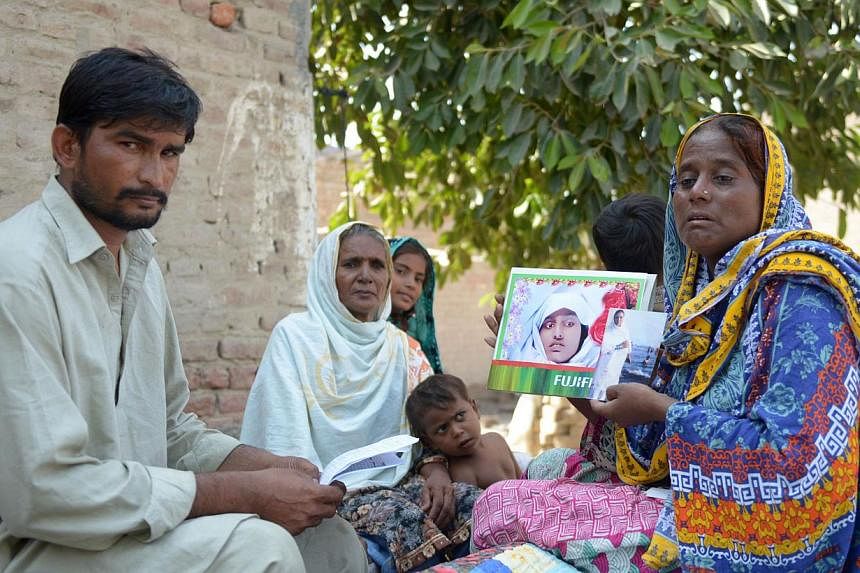As the world commemorated the International Day for the Elimination of Violence against Women last week, liberals in Pakistan celebrated a landmark judgment by the Lahore High Court.
On Nov 19, it handed death sentences to four men for stoning to death a pregnant relative, 25-year-old Farzana Parveen, who had married without their consent. The men were her father, brother, cousin and another relative.
They attacked her outside a courtroom in May, after she told the court that she had chosen to marry her second husband of her own free will.
Admitting the killing, her father said he had no regrets for "she had insulted all of our family by marrying a man without our consent".
Such "honour killings" are called "karo kari" in Pakistan.
Ms Farzana's father was able to kill her with impunity as there is a widely held belief among men in Pakistan, especially in rural areas, that the idea of killing for honour is not misplaced and that such an act is not a crime.
Since family members carry out such killings and the law allows the murdered women's next of kin to "forgive" the criminals, most murderers go free on the pretext of preserving family honour.
In a bizarre twist, Ms Farzana's second husband admitted to killing his first wife to marry her - and was forgiven by the family. This turn of events and Ms Farzana's own, widely publicised death are a telling indictment of the mediaeval state of societal beliefs and law in Pakistan.
In Pakistan's strict patriarchal culture, women must abide by socially restrictive practices pertaining to status and family honour. This leaves little freedom - for rural women especially - to lead the life of their choice as responsible adults in society.
Often, the most severe punishments for transgressions of honour or for bringing shame on a family are decreed by councils of tribal elders, in which women have no place.
With scant governance, the state does little to prevent killings or investigate and punish perpetrators.
Because of deeply held societal beliefs about honour and women as property, the government is unwilling or, at best, unable to prevent what is now the daily occurrence of crimes against women in the name of honour. That Ms Farzana was bludgeoned to death with bricks as police watched from the sidelines points to the apathy of law enforcement agencies towards such crimes.
The very nature of this belief in killing for honour is horrific, in the sense that the perpetrators commit murder believing that they are upholding justice - accusing the victim, instead, of committing a crime. Such an act has no basis in Islam, which teaches a consensual relationship between men and women.
Seeking justice in cases of murder is extremely problematic in Pakistan. A 2004 law made honour killing a crime of murder, but there is an Islamic injunction that allows the family of the victim to forgive the criminal, with or without blood money - a loophole frequently exploited under duress. The culprits are then free from prosecution and sentencing.
This very loophole allowed the United States to secure the release of Central Intelligence Agency contractor (CIA) Raymond Davis, who was charged with murdering two young Pakistani men in Lahore in 2011. Their families received blood money and pardoned him, which left him free from prosecution for murder.
The United Nations estimates that of the 5,000 deaths that occur annually from honour killings worldwide, 1,000 occur in Pakistan alone. Only 1 per cent of the perpetrators are punished. Even though modernity is creeping in, 83 per cent of Pakistanis support stoning for adultery, according to a Pew survey.
A petition circulated last year called on the UN to enact international laws to end stoning. Yet, when honour killing is a family activity, unless there is concerted societal action, international laws are inconsequential.
Pakistan ratified the UN Convention on the Elimination of All Forms of Discrimination against Women (CEDAW) in 1996, promising to abolish discriminatory laws and establish tribunals and public institutions to effectively protect women. CEDAW targets culture and tradition as factors that contribute to gender-based discrimination.
Despite the international commitment, human rights groups claim that honour killings have continued to increase in Pakistan, possibly because of a rise in extremism since the early 1980s.
A four-pronged approach is necessary to combat this mediaeval practice: improved education for women, leading to better economic opportunities; engaging religious and community leaders to send a strong message against such barbaric practices; strong government and community-supported campaigns promoting awareness of women's rights; and active international support in empowering women in developing nations to play their due role in their respective societies.
Without such total action, women will continue to suffer in much of the developing world.
The writer is an adjunct professor at the Lee Kuan Yew School of Public Policy, National University of Singapore. He was Pakistan's High Commissioner to Singapore, 2004-2008.

